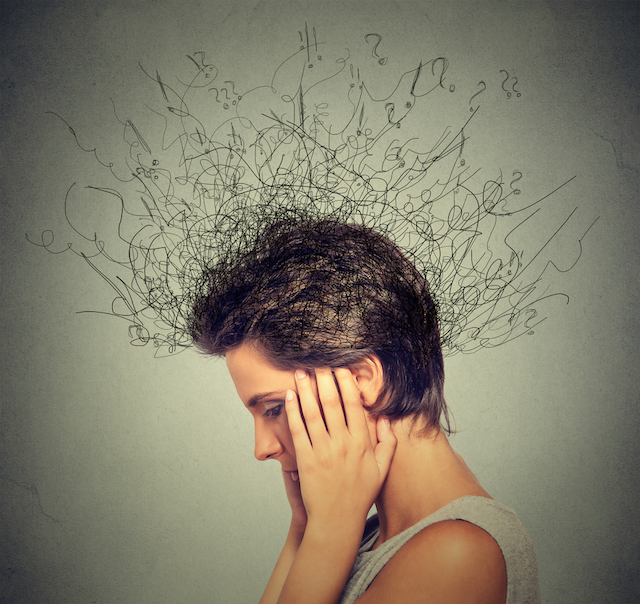
This morning my friend Susan told me that her college-aged daughter called at 2:45 a.m. in a panic. “Mom! I’m totally freaking out. What is happening?! I want to be able to decide what I can do with my body and whom I can marry!”
Susan gently stopped her and gave her advice to curb her panic. She reminded her daughter that her current rights were still in place and encouraged her to take a few deep breaths and try to get some sleep. Susan was having difficulty taking her own advice.
Unlike Susan’s daughter, I was asleep at 2:45 this morning. Finally. After a couple of hours riddled with hand-wringing anxiety. When I got up this morning, I applied lavender oil to my skin then went to my regular 6 a.m. yoga class—grateful for the community and the opportunity to set an intention for peace.
After a few hours of dodging social media and engaging in conversation with other practitioners of mindfulness this morning, I am now reflecting on the events of last night. I’m observing the anxiety I experienced and the impact it had on, not only how I processed this odd turn of events this morning, but how I will proceed from here.
Have you ever wondered what life would be like if we were completely free of anxiety?
Maybe this is something you’ve pondered. Especially if you’re like me and hard-wired for moving straight to panic mode—do not pass go, do not collect $200. It was certainly a question I posed to myself last night when my heart was pounding, and each of my temples was punctuated by the early onset of a gnawing headache.
There’s no sugar-coating it. The feeling of anxiety is no trip to the candy store, especially when accompanied by its many possible symptoms:
- nervousness, restlessness, or being tense
- the sense of danger, panic, or dread
- rapid heart rate
- rapid breathing, or hyperventilation
- shaking, trembling or muscle twitching
- feeling shortness of breath or smothering
- the sensation of choking
- chest pains or tightness
- nausea or gastrointestinal problems
- dizziness, light-headedness, or feeling faint
- feeling hot or cold
- numbness or tingling sensations (paresthesia)
- increased or heavy sweating
- weakness and lethargy
- insomnia
- difficulty focusing or thinking clearly about anything other than the thing we’re worried about
Given that being free of anxiety would mean liberation from this list of unsavory symptoms, an anxiety-free life sounds downright enticing, right?
Hold up a second, though. Consider this:
What if each time we experience anxiety, we choose instead to see how it’s beneficial?
It should be noted that I’m not attempting to oversimplify a serious condition. When I speak of anxiety, it is not in the context of chronic anxiety disorders that adversely affect the lives of millions of people. As one who has suffered that debilitating and terrifying brand of anxiety on numerous occasions, I can state unequivocally that it is far from beneficial.
It turns out, though, there are several ways that standard-issue, generalized anxiety can benefit body, work and just the way we move through life in general.
1. Anxiety inspires action.
When anxiety is created around a troubling situation, the result is the motivation to do what it takes to either avoid that situation or find a way to tackle it. Whether it’s something like dealing with a difficult coworker or noticing smoke coming from the kitchen, it inspires us to either deal with the cubicle irritant or instruct everyone to get out of danger’s way. It’s in our genetic make-up for survival.
In prehistoric times, humans needed the anxiety to help elicit the fight-or-flight response when they were threatened by looming things like dinosaurs or slow-moving ice barges. This, in turn, allowed the early homo sapiens like Captain Caveman to survive long enough to evolve to the more advanced homo sapiens like Fred Flintstone.
Of course, it’s all about dosage. The idea is to use anxiety in a constructive manner and not allow it to move into overload. Too much anxiety can have the opposite effect of paralysis.
2. Anxiety creates positive physical changes.
Contrary as it may seem, the physical reactions that stem from anxiety can be beneficial. Again, as long as the anxiety is not chronic.
While the body is sweating, the heart is pounding, and breath is heavier than an over-exerted St. Bernard (minus the drool), the body is simultaneously producing a surge of adrenaline—a hormone that enables people to become stronger, as the Anxiety Support Network notes.
When flushed with adrenaline, people can accomplish things they did not think possible, such as running faster or moving heavy objects—actions that come in especially handy in emergency situations. That same adrenaline can also help out with that project presentation or business proposal.
3. Anxiety makes us better able to empathize.
When people are in the throes of anxiety for any amount of time, and then they come out of it, they recognize the toll it took. The positive side of this is that as a person who has journeyed the harrowing road of anxiety may be more empathetic and understanding to the issues that others face.
Have you ever found comfort in helping friends, coworkers or family members deal with personal struggles that you’ve already endured? Then you get it.
Additionally, people with anxiety may also be skilled at leadership roles, both in relationships and in the workplace. This is the result of their cautious nature which compels them to consider the possibility of multiple outcomes. So while anxiety sufferers are highly aware of what can potentially go wrong, if they don’t dwell in that dark corner, they are also great problem-solvers.
4. Anxiety results in better decision-making.
Most of us have a tendency to be overly hopeful about the future. It’s a phenomenon that psychologists call “unrealistic optimism.” A disregard sustains this view for negative information and a preference for self-serving feedback. Thus, we’ll choose to ignore information that would negatively affect us, yet be flexible enough to “update” our thinking when receiving information that will help us.
New research out of the University College London shows, however, that once the element of anxiety is in the mix, the “update bias” is removed, resulting in better decision making.
In other words, if a person feels moderately anxious, they’re more likely to assess all the information rather than just filter out the good stuff, thus leading to more informed decision-making. This unfiltered information is helpful to managers and business owners who are looking to hire new employees.
Over the past decade, I’ve come to recognize that I’m an anxious person. Even if I don’t fully embrace it all of the time.
I have a fear of failure. When I was a kid I didn’t want to go to school when I had any tests that day. I was so afraid that I wasn’t going to pass that I would shake. Often I had to eat some herb pills to get me in shape again. Years were moving, I was getting older.
Interview for a new job? I feel like a 10-year–old kiddo who can’t add 2+2. Right now I’m stressed with New Year’s resolutions. I want to change and do few things in 2017: get a job in strategy consulting, travel to Thailand, buy a flat. I have goosebumps and hand-wringing whenever I think about it.
As I recall the events of last night, though, I understand it was my natural inclination to rocket to that anxious state. But I’m learning to be conscientious about the fear produced by my anxiety so that I can translate it into practical action. Psychologists refer to anxious people who do this as “healthy neurotics.” It’s a moniker I happily embrace.
It was anxiety that motivated me to move and stretch my body and my mind this morning in a way that carried more intention and meaning than usual. It continues to keep me focused today on the qualities that mean something to me—kindness, compassion, equality, love. The angst I felt earlier drew me to my fellow practitioners of mindfulness who reminded me to stay in touch with practices to keep my anxiety at bay when it was tempted to tip the scales.
Things such as:
- Establishing foundation through intention.
- Incorporating beginner’s mind.
- Patience.
- Acknowledgment of the experience.
- Non-judgment.
- Not clinging and not rejecting.
- Self-reliance.
- Letting be and allowing.
- Self-compassion.
By accepting and being with the anxiety I feel concerning this or any other situation, I lessen its ability to grip me and can instead achieve a balance and equanimity that allows me to gain a broader perspective.
It’s not starry-eyed complacence. Nor is it raging against the machine.
The instructor who led the class this morning is a friend of mine. He is a homosexual man in his 50s who has been the victim of discrimination and hatred. He’s also an eye doctor and a yoga instructor. They are jobs he relishes. He reminded me that the work we do for the betterment of humankind cannot be affected by the election of a single person who espouses hatred.
And he’s right.
Election aside, I’m not going to stop believing in the work I do, and I’ll continue to do it with patience, intention, self-compassion, non-judgment and just the right amount of anxiety to keep me going, without fear.
Do you have any thoughts of anxiety and how it relates to mindfulness? We’d love to hear them.
~
~
`
Author: Szymon Pelechowicz
Image: Courtesy of Author
Editor: Travis May


 Share on bsky
Share on bsky




Read 0 comments and reply